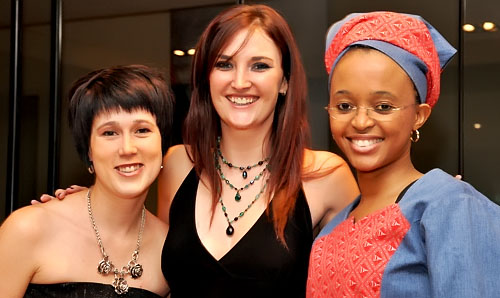 |
Some of the scholars taking part in the Vice-Chancellor's Prestige Young Scholars Programme are, from the left: Dr Andréhette Verster, Ms Liezel Kotzé and Dr Nthabeleng Rammile.
Photo: Stephen Collett |
The University of the Free State (UFS) has launched a programme that will provide an accelerated pathway to 25 young scholars with recent PhDs and teach them how to become professors through intensive local and international mentorship, research support and academic training.
The Vice-Chancellor’s Prestige Programme for Young Scholars focuses on the next generation of top researchers in South Africa who will fill the gap left by retiring academics. It will also add significantly to the diversity of the professoriate at the UFS.
No other university in the country has a programme of such scale and intensity for building excellence and diversity through young scholars.
“The programme is highly selective and limited to the most promising young scholars at the university. It will also contribute towards establishing an international reputation for the university and positioning the UFS as one of the best research institutions in the country,” said Prof. Neil Roos, Director of the Postgraduate School at the UFS. He will manage the programme together with Prof. Jackie du Toit, also from the university.
Running for the next three years, the programme will put the 25 scholars through an intensive programme of academic and scholarship support which includes advanced theoretical and methodological training and exposure to leading international scholars in their fields. They will also be exposed to intensive reading and writing programmes, high-level seminar and conference participation and presentation, accelerated publication schedules and personal mentoring and advising plans.
“Scholarship will only grow if there is a critical mass – and this is what we want to achieve at the UFS. We want to create a pool of young scholars, develop and connect them with international scholars and place them at top universities in the world where they can be mentored by the best in their respective fields,” said Prof. Jonathan Jansen, Vice-Chancellor and Rector of the UFS at the launch of the programme.
According to Prof. Jansen, the UFS aims to draw public intellectuals and A-rated scientists to the campus and make academic work attractive to academics at the university and countrywide.
The group of scholars has a good academic record, with 69% of them completing their PhDs within the last five years. The group is well represented in terms of race and gender; the majority are in the 26 to 30-year age group and specialisations include the social sciences (including education, the humanities and arts) as well as the natural sciences.
“Scholarship develops over time. We are proud and extremely honoured to be selected for this prestigious programme. With this scholarship we acknowledge the responsibility of building the UFS and of extending our knowledge across disciplines. We will establish a scholarly advancement for our university that will enable it to compete with the best in the world,” said Dr Nalize Marais, one of the prestige scholars.
The launch was also attended by members of the university’s International Advisory Council (IAC). This council, which visited the university the past week to advise the leadership on its future positioning strategies, especially in relation to its international aspiration to become a place of scholarship and service among the leading universities in the world, congratulated the UFS on this groundbreaking programme.
“You are lucky to have a leadership that dares to dream and that can act the dream. You are fortunate that your leadership wants to take this university forward and explore new horizons,” said Prof. Aki Saweyrr, former Secretary-General of the Association of African Universities in Ghana and member of the IAC.
Ending the evening’s programme was Dr Gansen Pillay, Vice-President of the National Research Foundation. Prof. Gansen also congratulated the UFS on its visionary and inspirational leadership. “It is a privilege to make a life-changing contribution to research in the world. Universities must take ownership of their own development – which is exactly what the UFS is doing. And, although this is a truly South African programme, it could have an impact on the rest of the world,” he said.